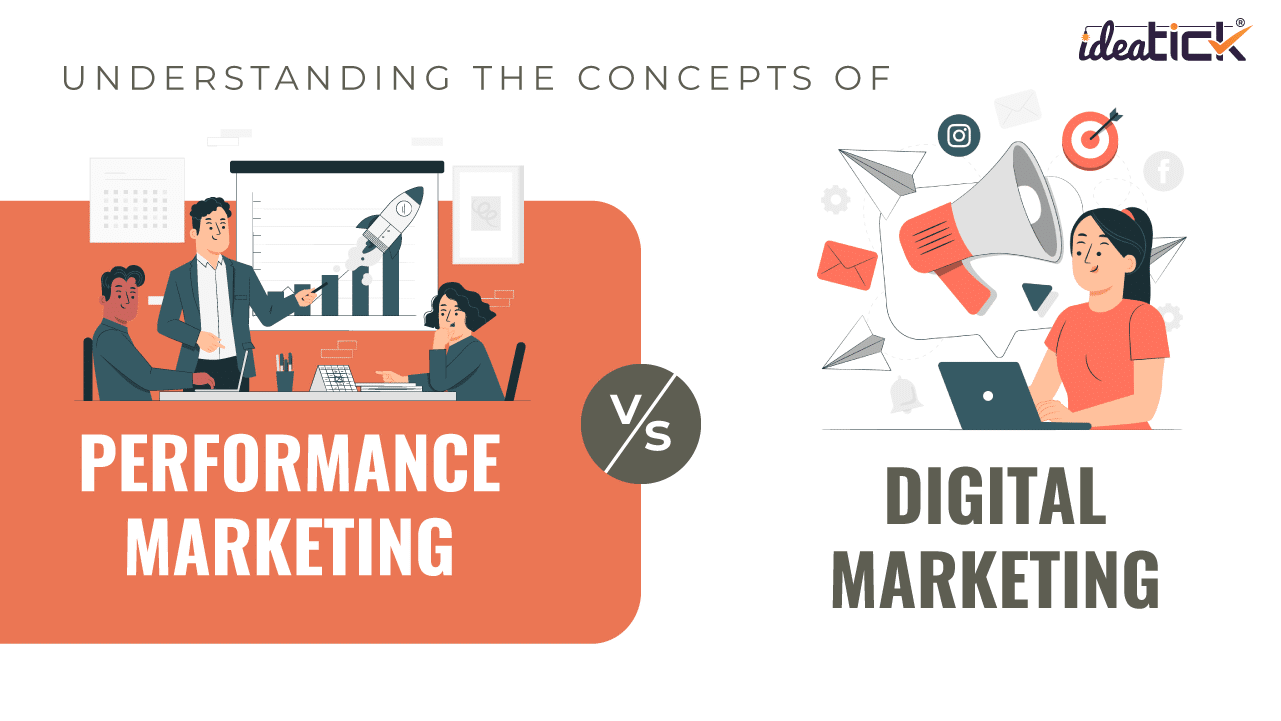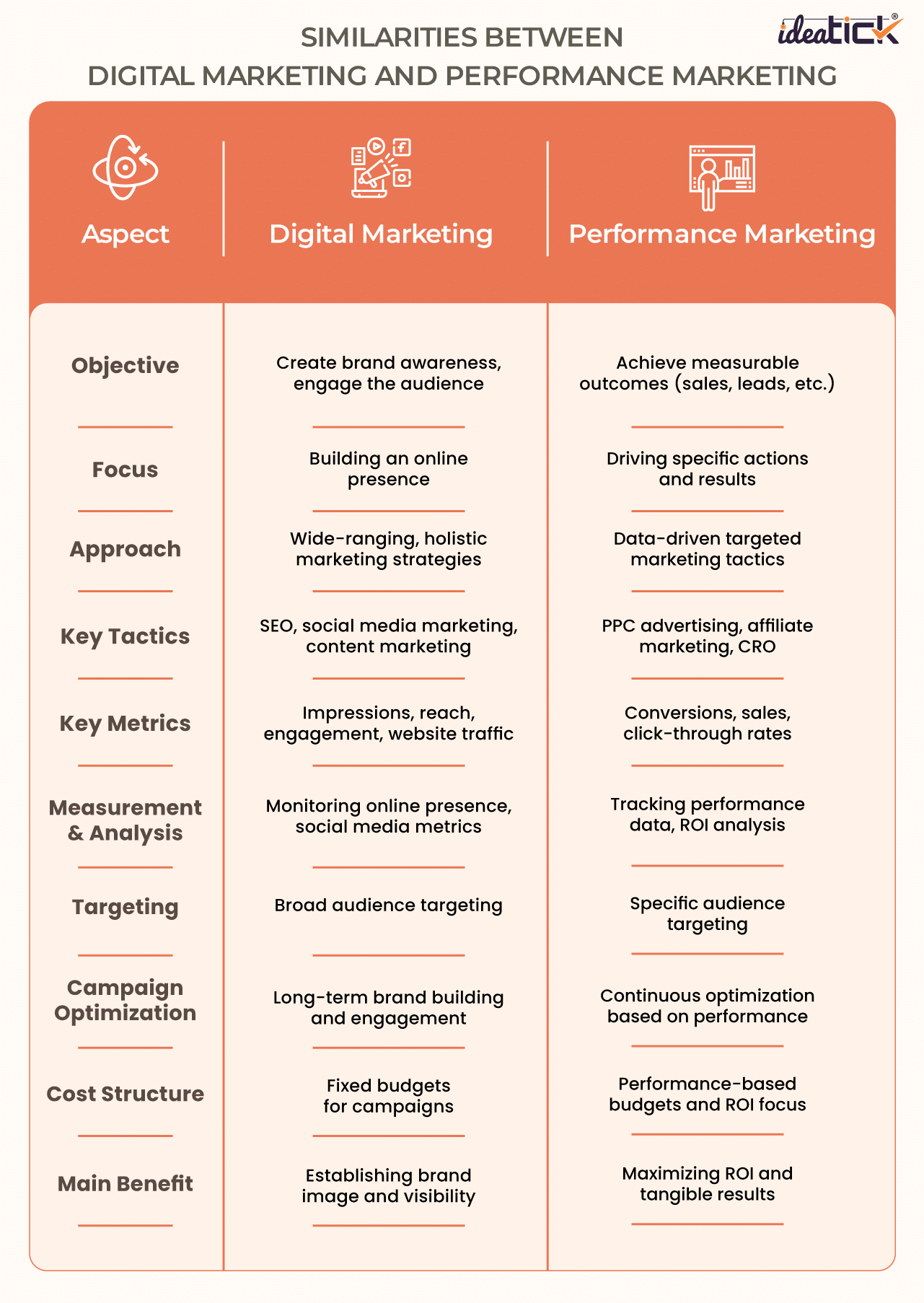Understanding the Concepts of Performance Marketing vs. Digital Marketing

As a marketer, you must have an accurate compass to navigate these uncharted waters since the winds of innovation and the tides of consumer behavior are constantly changing. Performance marketing and digital marketing shine as guiding lights in this environment, each providing special tactics to get you to your goal: the height of marketing success.
The older sibling, digital marketing, includes a variety of strategies that make use of numerous online channels, including websites, social media platforms, search engines, and email marketing. Through different digital touchpoints, it is a holistic strategy that strives to raise brand awareness, engage audiences, and encourage conversions. With a focus on creating an online presence and a strong brand identity, digital marketing reaches out widely to captivate the interest and allegiance of the sizable online population.
Performance Marketing, on the other hand, is the young, ambitious sibling. It emphasizes exact targeting, thorough analysis, and quantifiable results. Performance Marketing, which uses strategies like pay-per-click (PPC) advertising, affiliate marketing, and conversion rate optimization, thrives on data-driven approaches. Delivering concrete results, such as improved sales, leads, or any other predetermined key performance indicators (KPIs), is its main objective. Performance Marketing strives to conquer success, not merely to reach its beaches.
As we delve deeper into the realm of these marketing powerhouses, we will explore their differences, their shared strengths, and the scenarios where one outshines the other. We will witness how Digital Marketing casts a wide net, casting its message across vast audiences, while Performance Marketing wields a precision scalpel, targeting specific individuals with surgical accuracy.
What are Digital Marketing And Performance Marketing?
Digital Marketing refers to a broad range of strategies and tactics that leverage digital channels and platforms to promote products, services, or brands. It encompasses various online marketing techniques, including search engine optimization, social media marketing, content marketing, email marketing, display advertising, etc. The goal of digital marketing is to create brand awareness, engage with the target audience, drive website traffic, and generate leads or conversions through digital means.
Performance Marketing, on the other hand, is a results-oriented marketing approach. It focuses on achieving measurable outcomes, such as sales, leads, clicks, or other predefined key performance indicators (KPIs). Performance marketing relies heavily on data analysis and uses targeted strategies like pay-per-click (PPC) advertising, affiliate marketing, conversion rate optimization (CRO), and other performance-driven techniques. The main objective of performance marketing is to maximize return on investment (ROI) by delivering quantifiable results and optimizing campaigns based on performance data.
What Are The Types of Performance Marketing?
- Pay-Per-Click (PPC) Advertising: In PPC advertising, advertisers pay a fee each time their ad is clicked. It is commonly used in search engine advertising (e.g., Google Ads) and display advertising networks. Advertisers bid on keywords relevant to their target audience, and their ads are displayed when users search for those keywords or visit websites related to their products or services.
- Affiliate Marketing: Affiliate marketing involves partnering with affiliates who promote your products or services on their websites or other channels. Affiliates earn a commission for each sale, lead, or desired action generated through their referral. This type of marketing is often performance-based, as commissions are only paid upon successful conversions.
- Influencer Marketing: Influencer marketing leverages the reach and influence of individuals on social media platforms. Brands collaborate with influencers with a significant following and engage their audience to promote products or services. Performance-based influencer marketing often involves tracking and measuring the impact of the influencer’s content through metrics such as clicks, conversions, or sales.
- Email Marketing: Email marketing involves sending targeted emails to a list of subscribers to drive specific actions or conversions. Performance-based email marketing focuses on metrics like open rates, click-through rates, and conversion rates. It often includes personalized offers, promotions, or tailored content to engage recipients and drive desired outcomes.
- Conversion Rate Optimization (CRO): CRO aims to improve the conversion rate of a website or landing page by making strategic changes to design, layout, copy, or user experience. It involves testing different elements and analyzing data to optimize the website’s performance in lead generation, sales, or other conversion goals.
- Retargeting: Retargeting, also known as remarketing, involves targeting ads to users who have previously visited your website or interacted with your brand. It keeps your brand top-of-mind and encourages them to return and complete a desired action, such as making a purchase or filling out a form. Retargeting campaigns can be highly effective in driving conversions and re-engaging interested users.
What Are The Different Metrics To Measure Performance Marketing?
- Conversion Rate: The percentage of website visitors or users who complete a desired action, such as making a purchase, filling out a form, or subscribing to a newsletter.
- Return on Investment (ROI): The ratio of the net profit generated from a campaign compared to the cost of the campaign. It helps determine the profitability of the marketing efforts.
- Cost per Acquisition (CPA): The average cost incurred to acquire a new customer or lead. It is calculated by dividing the total campaign cost by the number of acquisitions.
- Click-through Rate (CTR): The percentage of users who click on an ad or link out of the total number of impressions. It measures the effectiveness of an ad in generating user engagement.
- Cost per Click (CPC): The average cost paid for each click on an advertisement. It is calculated by dividing the total campaign cost by the number of clicks.
- Revenue per Click (RPC): The average revenue generated per click on an advertisement. It helps assess the revenue-generating potential of each click.
- Return on Ad Spend (ROAS): The ratio of revenue generated to the cost of advertising. It indicates the efficiency of ad spending in generating revenue.
- Customer Lifetime Value (CLV): The predicted revenue a business can generate from a customer over the entire duration of their relationship. It helps determine the long-term value of acquiring and retaining customers.
- Engagement Metrics: Metrics like time spent on the site, pages per session, bounce rate, and social media engagement can indicate the user engagement level and interest in the marketing campaigns.
- Attribution Metrics: Metrics like first-click attribution, last-click attribution, or multi-touch attribution help determine the specific marketing channels or touchpoints that contribute to conversions and sales.
Benefits Of Performance Marketing?
- Measurable Results: Achieve specific outcomes with clear metrics.
- Cost Efficiency: Pay only for desired actions, optimizing budget allocation.
- Targeted Approach: Reach the right audience at the right time for better engagement.
- Flexibility and Scalability: Easily adjust campaigns based on business needs.
- Data-driven Optimization: Utilize insights to continuously improve performance.
- Enhanced ROI: Maximize efficiency and generate higher returns on investment.
How Does Performance Marketing Help?
- Achieving Measurable Results: Performance marketing focuses on specific outcomes, such as sales, leads, or conversions. By setting clear performance metrics, businesses can track and measure the success of their marketing efforts. This data-driven approach allows brands to gauge the effectiveness of their campaigns and make informed decisions.
- Optimizing Marketing Budget: With performance marketing, businesses only pay when desired actions are completed. This pay-for-performance model ensures marketing budgets are allocated to activities that generate tangible results. By minimizing wasteful spending on ineffective tactics, businesses can optimize their marketing budget and maximize its impact.
- Targeting the Right Audience: Performance marketing enables businesses to target specific audiences based on demographics, interests, behaviors, or previous interactions. By reaching the right audience at the right time, businesses can improve engagement rates and conversion rates. Precise audience targeting ensures that marketing efforts are focused on individuals most likely to be interested in their products or services.
- Driving Results and ROI: Performance marketing is designed to deliver measurable outcomes and maximize return on investment (ROI). By optimizing campaigns based on performance data, businesses can generate more sales, leads, or conversions. The ability to track and analyze campaign performance allows brands to identify areas for improvement and make necessary adjustments to drive better results.
- Scaling and Adaptability: Performance marketing campaigns can be easily scaled up or down based on business needs and budget. This flexibility allows businesses to respond to market dynamics, changes in consumer behavior, and shifting business objectives. By adapting their campaigns in real-time, brands can stay agile and ensure their marketing efforts align with their goals.
- Continuous Optimization: Performance marketing relies on data analysis and insights to continuously optimize campaigns. By testing different elements, such as ad copy, creatives, landing pages, or targeting parameters, businesses can refine their strategies and improve campaign performance. This iterative approach helps brands stay competitive and maximize the effectiveness of their marketing efforts.
Finally, the conflict between digital marketing and performance marketing reveals two separate strategies that can help firms reach new heights in the digital sphere. Performance marketing uses a precision scalpel to target people and produce quantifiable outcomes, in contrast to digital marketing, which casts a wide net and concentrates on creating an online presence and generating a brand image. The decision between them will rely on the objectives, available resources, and type of business. Both offer advantages.
It is important to keep in mind, though, that the strength of performance marketing and digital marketing resides not merely in comprehending their distinctions, but also in realizing their combined potential. Combining the wide reach and brand-building abilities of Digital Marketing with the data-driven accuracy and performance optimization of Performance Marketing, these two marketing behemoths can work together to forge a formidable force.
Working with a top digital agency like Ideatick can help brands navigate this difficult environment and maximize Performance Marketing and Digital Marketing. Ideatick can create customized tactics that are in line with corporate objectives thanks to their knowledge and experience, which allow them to comprehend the subtleties of these marketing techniques. Ideatick can assist organizations in realizing the full potential of Performance Marketing and Digital Marketing, whether it be through the creation of appealing campaigns, performance optimization, or utilizing the most recent market trends.
To stay ahead of the competition in this fast-paced digital era, organizations must adapt, innovate, and harness the potential of performance marketing and digital marketing. Brands can position themselves for success, produce significant results, and flourish in the ever-evolving digital landscape by embracing the distinctive qualities of each method and seeking the advice of a reputable digital agency like Ideatick.





